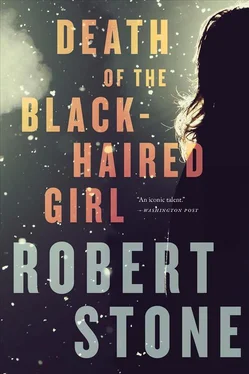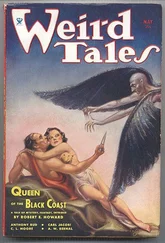He said nothing, only looked at her as though to ask how she could think being beautiful and prized could keep someone safe.
“I’m glad she can be with her mother,” Stack said then. “I don’t need any ceremony. She wouldn’t want it.”
“Whatever you want,” Jo said. “Whenever.” It became apparent to her that he was very ill. He took an inhaler out of his jacket pocket and breathed from it. She asked if he had asthma. Emphysema, he said. Severe.
“You know what I’d like?” Stack said. “I’d like to see the street where it happened.”
“Really?” Jo asked. She did not care for the idea.
“Yeah, I’d like to see the place.”
It was not clear to Jo whether Stack knew that Maud had been struck in front of the Brookman house. In any case, his wanting to see it made her distinctly uneasy.
“Can you direct me? Jo Carr? That your name?”
“Call me Jo, Ed.”
“Yeah,” he said, “sure.”
“I can show you the street if you want to see it.”
She led him out of the office and toward the muddy Common, edged in banks of soiled melted snow. The first of the homeless people had assembled for lunch, lined up along the spiked fence of First Presbyterian’s churchyard. Its carillon was sounding the Rose Carol.
Jo walked him around the Common and then started down Amity Street to Walnut and the hockey rink.
“You don’t have to come with me, Miss Carr. Just show me the way.”
“I don’t mind,” Jo said.
“I don’t want you to come.”
“Well,” she said, “it’s two blocks from here. If you turn left at the rink. On the right side of the street. Midway.” He nodded his thanks and she watched him walk in the direction of the rink. He had bought a cheap drugstore cane that morning to support himself on the part of his journey that would have to be covered on foot. He did not really lean on it as he walked — rather, he swung it in front of him at shin level, almost like a blind man. Still, in his weakened state his progress was slow. Watching him, she wanted to call him back, interrupt whatever he thought he was doing.
“Ed!”
He turned slowly, reacting to his first name.
“You know where to find me, Ed!”
“Sure thing.”
Back in the office, Jo found her end-of-term caretaking bogged down in petty details and worrisome distractions. The distraction that worried her most was the conversation she had just had with Edward Stack. That he had come to the college at all was disturbing, and she avoided the question of his visit during their exchange. Finally it worried her enough to phone Salmone at the police station and mention that she had seen Stack. She called Salmone rather than college security because she knew he had spent time with Stack in the NYPD. She also had a question for the lieutenant, the answer to which she hoped would allow her to rest easier.
“He asked me to direct him to the scene of his daughter’s death,” she said when she had Salmone on the line. “It seemed a reasonable thing. I guess I didn’t put it all together in that moment. It being the Brookmans’ house.”
“Was he threatening? Was he agitated?”
“I didn’t think so.”
“Had he been drinking?”
“It occurred to me. I thought he might have been, but he wasn’t acting very intoxicated and there wasn’t a detectable booze aura there.” A little cagey was how she thought of him later.
Salmone thanked her for the call.
“Lieutenant? Did you find out anything about the man I mentioned? The man who calls himself Father Walter?”
“Your guy is dead ten years, Dr. Carr.”
“Is that certain?”
“Seems really certain. He was well known where he lived. Somewhere in Louisiana, as I remember. He died of cancer. Had it a long time.”
“A man came to see me one evening. Livid about Maud’s article. I would have sworn it was Walter. I knew him well. If someone asked me in court if I’d seen him, I would have sworn on the Bible this was the same man.”
“Couldn’t be, Dr. Carr. He was a well-known figure. Death’s been established.”
“You made a special inquiry?”
“Hey, we pushed those people so hard they think we’re nuts. Your Father Walter is dead. No question.”
When he had identified Brookman’s house, Stack found a bench with a dedicatory plaque under a massive catalpa tree almost directly across the street from it. He was out of breath after his walk from the counseling office; the place to sit and the warm sun were welcome. The day was bright, the street fairly quiet since the students were away now and many of the buildings were closed. Around the Common, two blocks away, the hour was told in Christmas hymns by each church in turn.
As Stack settled against one end of the bench, the holstered Glock thudded against its armrest. He laid his cane down the length of the seat and read the plaque. The dedication was to a professor and his wife whose favorite tree it had been, subscribed to by former students after their deaths, sometime in the 1930s. Nice world they lived in, he thought, but of course it would not have seemed that way to them. Stack stretched his embittered, whiskey-poisoned bones on the slats. So quiet was it that he might listen to the twittering of riverside swallows that had established themselves in the park shed’s ornamental eaves. Sitting here he could almost hear the impact that had crushed the last living breath out of his only child along with the skittering of the swallows and the earliest doves of afternoon, reporting into the quiet spaces.
At first Stack had cried over the violence of his daughter’s death. But the more he thought about it, the more it seemed connected to his own fate and nature, and he cried no longer. It took a certain kind of individual to wipe out a beauty like Maud’s. But she was only Stack’s Maud and Stack was a thief and Maud was another and they had thrived on loot. Was that putting it too harshly?
It was all easy to understand. Stack the monster and the monster’s lovely daughter — it was a rendering of justice against both of them. Because she was Maud, the sometime thief, the spoiled and selfish. Because she was his beautiful brilliant only child. Because he loved her so much more than life. Because he and her mother loved her so much.
As for himself, he thought, for all the gifts he might have started with, he was a burnout and a drunk, not even a mediocre policeman, a lousy one in fact, and not a particularly honest one. A coward, morally and sometimes physically. A spiteful, vengeful nurser of old wounds, a bigot at heart, a rejoicer in the defeats of others, a betrayer of his adoring wife as womanizer and cuckold. An accessory to sometimes vicious things and to crimes he lacked the stones to perpetrate or prevent.
It seemed to him he had been poisoned by anger long before he had any right to it. It must be in his blood, he thought, the anger. He had known honor and pretended to despise it, and come in the end to really despise it, to dread hope, fear light, laugh off all the dreams of justice, laugh it all off. Those were the reasons she was dead.
Looking across the street from his bench, he saw a tall woman in a tan raincoat coming up the street with her eyes on the sidewalk. She wore glasses, and a scarf was tied loosely around her neck. With her was a girl of ten or so. The child drew Stack’s attention. She had darker hair than her mother and was at an awkward age of her growth. Her wrists showed beyond the sleeves of her ski jacket. She was tall and long-legged but her face, with its high forehead, was dour, downright sad, the face of a noticeably intelligent little girl. As they stopped in front of the Brookman house her mother pulled her sleeve at the elbow, reminding her that they were home. For a moment the woman stood looking down at her daughter with concern, touching her hair lightly, her face drawn with worry and unhappiness. They would be Brookman’s people, Stack decided, engaged in the pleasures of parenting. In that moment Stack realized how different his life would be as the father of dead Maud.
Читать дальше












